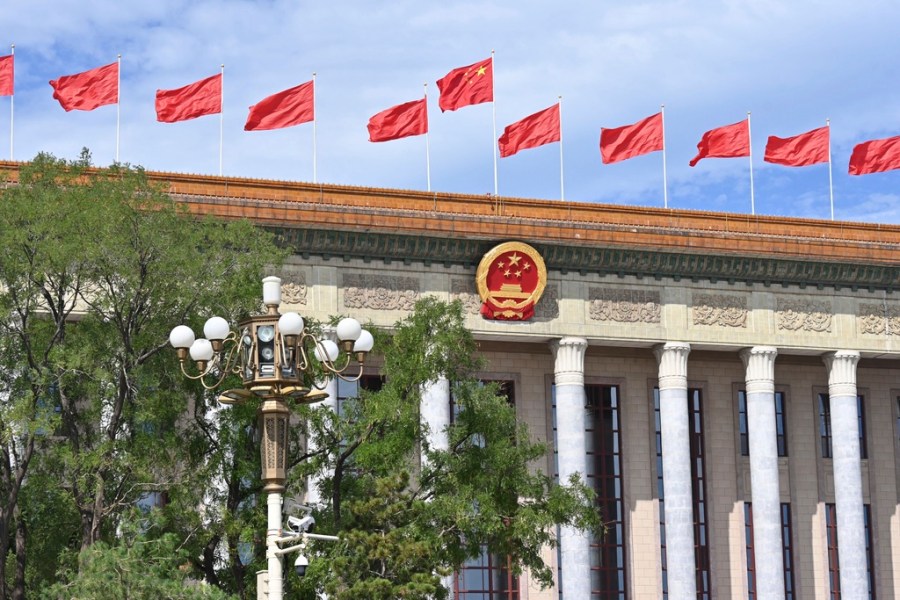
From the pasta aisles of Rome to the ketchup bottles and beauty products in American supermarkets, the bitter fruits of Uyghur forced labor are making their way into kitchens and makeup cabinets worldwide.
The odds are that Xinjiang’s tainted harvest has wound up in your home, too.
China’s northwestern Xinjiang region is notorious for mass human rights abuses, from internment camps to the sterilization of Uyghur women. New research into its role in global food production reveals a new form of control: using agricultural industrialization to dismantle traditional communities.
Our new findings reveal that Beijing engages not only in mass Uyghur forced labor but also enforces large-scale land grabs in ethnic communities. Chinese producers of food and cosmetics products rake in the profits.
Xinjiang accounts for 15 percent of the globe’s tomato paste, 10 percent of all chili peppers, 65 percent of pepper pigment used in cosmetics and food coloring, and an expanding share of the popular zero-calorie sweetener stevia.
Our new research, published by an international network of China scholars, exposes how Xinjiang’s growing agricultural sector was built by systematically separating farmers from their land and forcing them into industrial work. The resulting system of forced agricultural industrialization has infiltrated global supply chains.
Beijing controls and exploits Uyghur farmers through four main mechanisms: forced agricultural production, land grabbing by Chinese corporations, the forced labor of farmers and of camp detainees, and the active complicity of major Chinese agribusinesses in entering Uyghur homes to enforce intrusive state policies. Guannong, a major producer of tomato paste, operates its own armed militia for this purpose.
The scale of this operation is staggering. From 2001 to 2021, the region saw a 50-fold surge in land transfers — the displacement of ethnic farmers by state-backed agribusinesses. In some localities, authorities openly acknowledge transferring as much as 90 percent of farmland away from ethnic farmers in a single season. China’s official 2019 yearbook on Rural Poverty and Regional Economic Development states that land transfer reform must “combine coercion and inducement.”
Government documents reveal that after “liberating” farmers from their land rights, authorities direct them to work at industrial sites operated by state-affiliated companies. This means that dispossessed Uyghur farmers now rely on work in the very companies that claimed their lands, or else they toil on land they once owned.
Global corporate entanglement runs deeper than many realize. Our research identified 72 international and 18 Chinese companies linked to Xinjiang’s agricultural products, including major brands like Kraft Heinz, Nestlé, Del Monte, PepsiCo, McCormick, Unilever, and L’Oréal maintaining direct or indirect connections. Three major Xinjiang-based companies — COFCO, Chalkis, and Chenguang Biotech — operate subsidiaries in the U.S. and Europe.
When confronted with our findings, western corporate responses reveal a concerning pattern. Del Monte defended its continued supplier relationship with COFCO by citing supplier-provided social audits — a practice experts say cannot effectively assess state-imposed labor in China, where auditors face intimidation and workers are not allowed to speak freely under national security laws.
Kraft Heinz acknowledged using COFCO-supplied tomato products in China and Central Asia. However, our research found that in 2023 and 2024, its subsidiaries in Egypt, India, Indonesia and New Zealand also purchased COFCO tomato paste. Worse, Kraft Heinz maintains a strategic partnership with COFCO by which many Xinjiang tomatoes are grown from its seeds. This is a classic example of how western know-how is enabling an ongoing atrocity.
L’Oréal denied direct ties to tainted suppliers but did not comment on indirect supply chain relationships via intermediary entities in Asia that our research uncovered.
China provides nearly half of Italy’s tomato paste imports via Belt and Road shipping routes. Italy, the world’s largest exporter of processed tomato products, has therefore become a key conduit for Xinjiang’s state-imposed forced labor products to flow into global markets.
One Xinjiang-based producer established a shell company with zero employees to “protect” its foreign trade, shipping thousands of tons of tomato products to Italy. Tests of 17 tomato products sold in European supermarkets revealed Chinese origin despite labels claiming Italian provenance.
Behind these commercial arrangements lies Beijing’s broader strategy of using agricultural industrialization policies to “end the dominance” of the Uyghur population in its traditional homeland.
By evicting Uyghur farmers from their land and dismantling their traditional communities, the Chinese Communist Party aims to forcibly assimilate minorities into Chinese industrial agribusinesses as part of a process they term “population optimization.” Major Chinese producers of industrial inputs for food and cosmetics products are directly complicit in these policies.
To address this challenge, authorities must strengthen the enforcement of legislation banning imports from the Uyghur region to match Beijing’s evolving tactics. American and other global corporations should no longer be able to hide behind inadequate audits. They should be required to fully disclose their supply chains for high-risk commodities. Regulators must increase scrutiny of intermediary countries that facilitate supply chain obfuscation.
The evidence shows that Beijing has adapted its system of repression in Xinjiang by doubling down on state-imposed forced labor and expanding the dispossession of ethnic farmers. The question now is whether the international community will adapt its response to counter it.
Adrian Zenz is director of China Studies at the Victims of Communism Memorial Foundation.

